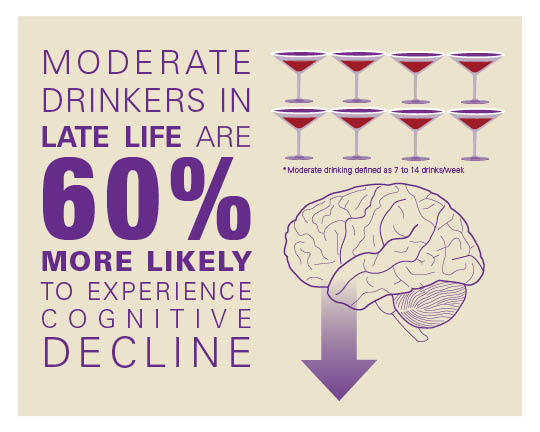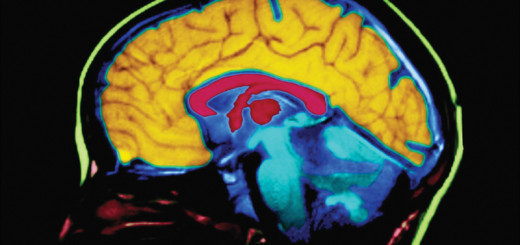Could Alcohol Be Bad for Your Brain?
Two new studies were released today at the Alzheimer’s Association International Conference that talk about alcohol consumption and Alzheimer’s disease. Read about all the new findings in the press release below or at www.alz.org/aaic.
Late-Life Binge Drinking and Other Patterns of Alcohol Use May Increase Risk of Cognitive Decline
VANCOUVER, July 18, 2012 – Light to moderate alcohol consumption has generally been considered to have some health benefits, including possibly reducing risk of cognitive decline. However, two studies reported today at the Alzheimer’s Association International Conference® 2012 (AAIC® 2012) in Vancouver suggest that moderate alcohol use in late-life, heavier use earlier in life, and “binge” drinking in late-life increase risk of cognitive decline.
“The many dangers of misuse of alcohol, and some of its possible benefits, have been widely reported, and there needs to be further clarification by the scientific community,” said William Thies, PhD, Alzheimer’s Association® chief medical and scientific officer. “Certainly no one should start drinking in order to reduce Alzheimer’s risk, as these two new reports attest.”
“We need to know more about what factors actually raise and lower risk for cognitive decline and Alzheimer’s disease. To do that, we need longer term studies in larger and more diverse populations, and we need more research funding to make that happen. We have learned incredible amounts about heart disease and stroke risk from long-term research like the Framingham Study – we have solidly proven lifestyle risk factors that people can act on every day. Alzheimer’s now needs its version of that research,” Thies added.
“In 2050, care for people with Alzheimer’s will cost the U.S. more than $1 trillion, creating an enormous strain on the healthcare system, families, and federal and state budgets. Recognizing this growing crisis, the first-ever U.S. National Plan to Address Alzheimer’s was unveiled in May. Now this plan must be swiftly and effectively implemented. We need Congress to support this implementation with an additional $100 million for Alzheimer’s research, education, outreach and community support,” Thies said.
20-year alcohol consumption patterns and cognitive impairment in older women
Whether moderate alcohol consumption has an impact on cognitive impairment in late-life is unsettled with some studies suggesting a protective effect. To date, few studies have examined patterns of alcohol consumption over time in relation to cognitive status, especially in very late-life.
Tina Hoang, MSPH, of NCIRE/The Veterans Health Research Institute, San Francisco and the University of California, San Francisco, and colleagues followed more than 1,300 women aged 65 and older for 20 years. They measured frequency of current and past alcohol use at the beginning, midpoint (years 6 and 8) and late phases (years 10 and 16) of the study. The researchers assessed participants at the end of the study for mild cognitive impairment and dementia. At baseline, 40.6% were nondrinkers, 50.4% were light drinkers (0 to 7 drinks/week), and 9.0% were moderate drinkers (7 to 14 drinks/week). Heavy drinkers (14 drinks/week) were excluded.
The scientists found that:
- Women who reported drinking more in the past than at the beginning of the study were at 30% increased risk of developing cognitive impairment.
- Moderate drinkers at baseline or at midpoint had similar risk of cognitive impairment to non-drinkers; however, moderate drinkers in the late phase of the study were roughly 60% more likely to develop cognitive impairment.
- Women who changed from nondrinking to drinking over the course of the study had a 200% increased risk of cognitive impairment.
“In this group of older women, moderate alcohol consumption was not protective,” Hoang said. “We found that heavier use earlier in life, moderate use in late-life, and transitioning to drinking in late-life were associated with an increased risk of developing cognitive impairment. These findings suggest that alcohol use in late-life may not be beneficial for cognitive function in older women.”
“It may be that the brains of oldest old adults are more vulnerable to the effects of alcohol, but it is also possible that factors associated with changing alcohol use related to coping or loss could be involved. Clinicians should carefully assess their older patients for both how much they drink and any changes in patterns of alcohol use,” Hoang added.
Binge drinking increases risk of cognitive decline in older adults
Little is known about the cognitive effects of heavy episodic (or “binge”) drinking in older people. Binge drinking is a pattern of alcohol consumption in which someone who is not otherwise a heavy drinker consumes several drinks on one occasion.
“We know that binge drinking can be harmful,” said Dr. Iain Lang of Peninsula College of Medicine and Dentistry, University of Exeter, UK. “For example, it can increase the risk of harm to the cardiovascular system, including the chance of developing heart disease, and it is related to increased risk of both intentional and unintentional injuries.”
According to Lang, it is not clear whether binge drinking in older adults has a damaging effect on cognitive health and whether it increases the risk a person will develop dementia.
Lang and colleagues conducted a secondary analysis of data from 5,075 participants aged 65 and older in the Health and Retirement Study (HRS), a biennial, longitudinal, nationally representative survey of U.S. adults age 50 and older, to assess the effects of binge drinking in older people on cognition and mood. Baseline data were collected in 2002 and participants were followed for eight years. Consumption of four or more drinks on one occasion was considered binge drinking. Cognitive function and memory were assessed using the Telephone Interview for Cognitive Status.
Binge drinking once a month or more was reported by 8.3% of men and 1.5% of women; binge drinking twice a month or more was reported by 4.3% of men and 0.5% of women.
The researchers found that:
- Participants who reported heavy episodic drinking once per month were 62% more likely to be in the group experiencing the highest decline in cognitive function, and were 27% more likely to be in the group experiencing the highest amount of memory decline.
- Participants reporting heavy episodic drinking twice per month or more were 147% more likely to be in the group experiencing the highest decline in cognitive function, and were 149% more likely to be in the group experiencing the highest amount of decline in memory.
Outcomes were similar in men and women when analyzed separately.
“In our group of community-dwelling older adults, binge drinking is associated with an increased risk of cognitive decline,” Lang said. “Those who reported binge drinking at least twice a month were more than twice as likely to have the greatest decline in both cognitive function and memory. These differences were present even when we took into account other factors known to be related to cognitive decline such as age and level of education.”
“This research has a number of implications. First, older people – and their physicians should be aware that binge drinking may increase their risk of experiencing cognitive decline and encouraged to change their drinking behaviors accordingly. Second, policymakers and public health specialists should know that binge drinking is not just a problem among adolescents and younger adults; we have to start thinking about older people when we are planning interventions to reduce binge drinking,” Lang added.
About AAIC®
The Alzheimer’s Association International Conference® (AAIC) is the world’s largest conference of its kind, bringing together researchers from around the world to report and discuss groundbreaking research and information on the cause, diagnosis, treatment and prevention of Alzheimer’s disease and related disorders. As a part of the Alzheimer’s Association’s research program, AAIC serves as a catalyst for generating new knowledge about dementia and fostering a vital, collegial research community.
About the Alzheimer’s Association®
The Alzheimer’s Association is the world’s leading voluntary health organization in Alzheimer’s care, support and research. Our mission is to eliminate Alzheimer’s through the advancement of research, to provide and enhance care and support for all affected, and to reduce the risk of dementia through the promotion of brain health. Our vision is a world without Alzheimer’s. Visit www.alz.org or call 800-272-3900.
- Tina Hoang, et al. 20-Year alcohol consumption patterns and cognitive impairment in older women. (Funder: National Institute on Aging)
- Iain Lang, et al. Heavy episodic drinking and risk of cognitive decline in older adults. (Funder: National Institute for Health Research (NIHR) Collaboration for Leadership in Applied Health Research and Care (CLAHRC) for the South West Peninsula)
O4-08-05 Wednesday, July 18 / Oral, 3:30-5 pm
20-Year alcohol consumption patterns and cognitive impairment in older women
Tina Hoang1, Deborah Barnes2, Amy Byers3, Kristine Yaffe3
1NCIRE, San Francisco, California, United States; 2University of California, San Francisco, California, United States; 3University of California, San Francisco; San Francisco Veterans Affairs Medical Center, California, United States
Presenting author e-mail: tina.hoang@va.gov
Background: The association between moderate alcohol consumption and cognitive impairment in late-life is controversial with several studies suggesting a protective effect. Few studies have considered patterns of alcohol consumption over time, especially in very late-life.
Methods: We studied 1306 women ≥ 65 years old, enrolled in a prospective cohort study and followed for 20 years. Frequency of current and past alcohol use was assessed by self report at baseline and current use reassessed at midpoint (years 6 and 8) and late phases (years 10 and 16) of follow-up. Clinically significant cognitive impairment (mild cognitive impairment and dementia) was adjudicated by an expert panel at year 20.
Results: At baseline, mean age of participants was 68.3(SD=2.8); 40.6% were nondrinkers, 50.4% were light drinkers (0 to 7 drinks/week), and 9.0% were moderate drinkers (≥7 and “°¤ 14 drinks/week). Heavy drinkers, >14 drinks/week were excluded, n=10 (0.8%). Women who reported drinking more in the past than at baseline were at increased risk of developing cognitive impairment (adjusted OR [aOR]=1.30, 95% CI 1.02-1.65). Moderate drinkers at baseline or at midpoint had similar risk of cognitive impairment compared to non-drinkers; however, moderate drinkers in the late phase were more likely to develop cognitive impairment (aOR=1.62, 95% CI 1.14-2.32). Women who changed from nondrinking to drinking over the follow-up period also had an increased risk of cognitive impairment (aOR=3.07, 95% CI 1.39-6.76), while transitioning from drinking to nondrinking over time was not associated with cognitive impairment.
Conclusions: In this older female cohort, moderate alcohol consumption was not protective. We found that heavier use earlier in life, moderate use in late-life, and transitioning to drinking in late-life were associated with an increased risk of developing cognitive impairment. These findings suggest that alcohol use in late-life may not be beneficial for cognitive function in older women.
O4-08-06 Wednesday, July18 / Oral, 3:30-5 pm
Heavy Episodic Drinking and Risk of Cognitive Decline in Older Adults
Iain Lang1, Kenneth Langa2, Robert Wallace3, David Llewellyn1
1Peninsula College of Medicine and Dentistry, Exeter, United Kingdom; 2University of Michigan, Ann Arbor, Michigan, United States; 3University of Iowa, Iowa City, Iowa, United States
Presenting author e-mail: iain.lang@pms.ac.uk
Background: Although the consequences for cognitive function of overall levels of alcohol consumption have been studied little is known about the possible harmful effects of heavy episodic (“binge”) drinking in older people. The purpose of this study was to assess the effects of heavy episodic drinking in older people in the United States on cognitive decline and depressive symptoms.
Methods: Secondary analysis of data from 5,075 participants aged ≥65 years in the Health and Retirement Study (HRS), a biennial, longitudinal, nationally representative survey of US adults aged over 50. Baseline data were collected in 2002 and participants were followed up for eight years. Overall level of alcohol consumption and level of heavy episodic drinking (consumption of four or more drinks on one occasion) were assessed at baseline and models were adjusted for age, sex, mean number of drinks/day, baseline cognitive function score, race, level of education, household wealth, and smoking status. Outcomes were change in cognitive function and memory (assessed using the Telephone Interview of Cognitive Status).
Results: Binge drinking on average once a month or more frequently was reported by 8.3% of men and 1.5% of women, and binge drinking on average twice a month or more was reported by 4.3% of men and 0.5% of women. In participants who reported heavy episodic drinking once per month or more the odds ratios (OR) of being in the group experiencing the greatest 10% of decline in cognitive function were 1.62 (95% Confidence Interval (CI) 0.99 to 2.65) and of decline in memory were 1.27 (95% CI 0.71 to 2.28). In those reporting heavy episodic drinking twice per month or more the OR of being in the group experiencing the greatest 10% of decline in cognitive function were 2.47 (95% CI 1.31 to 4.60) and of decline in memory were 2.49 (95% CI 1.19 to 5.21). Outcomes were similar in men and women when analyzed separately.
Conclusions: In community-dwelling older adults, heavy episodic drinking is associated with an increased risk of cognitive decline.
Contact:
Alzheimer’s Association
Media line: 312.335.4078
E-mail: media@alz.org



















2 Responses
[…] View the original article here […]
[…] for carriers of the apo-E4 gene variant, a major inherited risk factor for Alzheimer’s. A study presented at the Alzheimer’s Association conference in 2012 found that women who started drinking in later […]